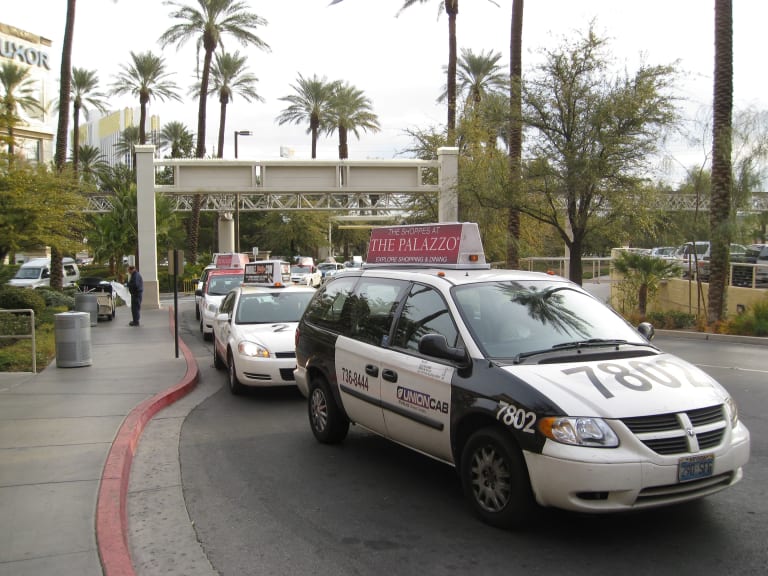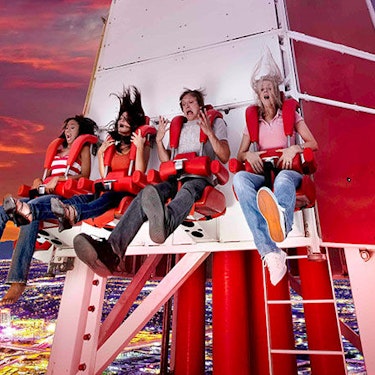More about: Las Vegas Natural History Museum Tickets and Tours
The so-called "Sin City" has many attractions to offer: casinos, tours and permanent shows. Therefore, during your visit you might be unsure of what to see and do in Las Vegas. In this regard, a good option would be to incorporate a tour of the Museum of Natural History into your schedule. You will be amazed by the exhibits present in each of the rooms.
You can learn about prehistoric mammals, learn about marine and wildlife, discover the treasures of Egypt, observe life-size whales hanging from the ceiling of the room, among others. You'll also have the chance to interact with some of the exhibits by touching the bears' fur or pressing a button to make it rain in the middle of the African savannah.
How much do tickets to the Las Vegas Natural History Museum cost?

The average ticket price to the Las Vegas Natural History Museum is approximately 12 euros. You can purchase your tickets physically at the museum's ticket office or buy them online through the museum's official website.
The Las Vegas Museum of Natural History also offers a number of discounts on tickets, which can benefit you by saving between 2 and 6 euros per person:
- Seniors over 54, military and students pay an average price of 10 euros.
- Children from 3 to 11 years old pay approximately 6 euros.
- Children under the age of 2 are free.
Is admission to the Las Vegas Natural History Museum included in any of the city's sightseeing passes?

Yes, admission to the Las Vegas Natural History Museum is included in some of the city' s tourist passes such as the Las Vegas Pass, Go Las Vegas Card or Las Vegas Explorer Pass.
This is a PDF card with a QR code, which allows you to enter the museum or other attractions in the city without paying or queuing. All you have to do is go to the ticket office and scan the pass you have previously saved on your mobile phone.
Las Vegas Natural History Museum opening hours

The Las Vegas Museum of Natural History opens its doors to the public every day from 9:00 am until 4:00 pm, with the last entrance at 3:00 pm, i.e. 60 minutes before closing time.
There are some holidays when opening hours vary. For example:
- Christmas Eve, from 10:00 am to 2:00 pm.
- Easter from 11:00.
- New Year' s Eve at 12:00 noon.
What days does the Las Vegas Museum of Natural History close its doors?

Annually, the Las Vegas Natural History Museum closes its doors to the public on two specific days. These are Christmas Day (25 December) and Thanksgiving Day, i.e. the fourth Thursday of each November.
Are there guided tours of the Las Vegas Natural History Museum?

Yes, the museum has a guided tour of the "Treasures of Egypt" room, where you can learn about the ancient Egyptian civilisation, whose history spans a period of more than three millennia.
This is a tour of approximately 30 minutes, aimed at small groups of tourists, who wish to delve into the history of each of the exhibits in the Egyptian room. The tour is led by the Director of the Las Vegas Natural History Museum.
This tour is available on Mondays, Wednesdays, Thursdays, Fridays and Saturdays for approximately 76 euros per person. You must book this tour at least three days in advance.
How to get to the Las Vegas Natural History Museum?

The Las Vegas Museum of Natural History is located on North Las Vegas Boulevard, just north of downtown between the Cultural Corridor and the Neon Museum. So, depending on where you are, you can get there on foot, in your car, in a taxi or via the monorail.
For example, if you are in downtown Las Vegas you will have to travel a distance of approximately 1.5 kilometres, which corresponds to a walk of at least 20 minutes. But, if you are on Las Vegas Blvd north of the Strip, then you will have to travel a distance of 8 kilomet res. In this case, it's best to hop in a taxi to get there quickly.
You can also hop on the Las Vegas Monorail, which runs from the Sahara Hotel & Casino Complex in the Winchester neighbourhood to Las Vegas Boulevard.
What to see at the Las Vegas Museum of Natural History?

At the Las Vegas Museum of Natural History you'll find two levels with several rooms, which you can explore carefully to learn about the evolution of animals and plants through the ages.
Las Vegas Natural History Museum Upper Level
This level is the largest level of the Las Vegas Natural History Museum and features six rooms with hundreds of artefacts, recreations of prehistoric animals, marine animals, ancient treasures, among others. For example:
- Prehistoric Life, you will see mechanical animals such as Tyrannosaurus Rex, an Ankylosaurus, Triceratop and the marine reptile Ichthyosaurus.
- Marine Life you will enjoy a giant tank with sea creatures (rays, fish, sharks, turtles, etc). Also, hanging from the ceiling you will observe some species of whales and sharks.
- International Wildlife Gallery with an amazing display of animals (antelopes, deer, bears, felines, etc.).
- Nevada Wilderness with Nevada wildlife such as foxes, bighorn sheep, etc.
- Geology Gallery with an exhibition of fluorescent minerals.
- Treasures of Egypt is another room where you can see replicas of approximately 500 Egyptian artefacts, including Tutankhamun's chariot and his throne. Also in the gallery is King Tut's sarcophagus over his tomb and burial chamber, where you can walk around.
Lower Level of the Las Vegas Museum of Natural History
Walking through the lower level of the Las Vegas Natural History Museum you will find a total of three galleries, in which you will see:
- African Savannah Gallery. Here you will find hippos, lions, wild boars, hyenas, wildebeests, among other animals. In addition, you will be able to observe some scenes of predation.
- African jungle where you can make it rain at the touch of a button.
- Learning Laboratory, a space with interactive exhibits, which allows a better experience, especially for children.
Is it advisable to go to the Las Vegas Natural History Museum with children?

Yes, the Las Vegas Natural History Museum is an ideal place for the little ones in the house, as they will learn while having fun. They can learn about wildlife, explore part of the origin of the earth, and discover the treasures of one of the oldest civilizations: the Egyptians.
This is definitely a cultural activity not to be missed, and should be added to your list of the top 10 things to do in Las Vegas with Kids. Adults will also enjoy this short tour of the museum's halls.
How much time do you need to visit the Las Vegas Natural History Museum?

The two-story building that makes up the Las Vegas Natural History Museum has been designed to be toured in about an hour. This way, people can take this educational tour and then move on to other activities. For example, attend some of the best shows in Las Vegas on the Strip, go shopping, join the food tours, among others.
However, there are people who need more time to stop and admire each of the exhibits and galleries. The same applies to those who visit the museum with children, as the little ones are usually quite curious and like to repeat the experiences learned during the tour. This is especially true for the exhibits that can be interacted with.
Does the Las Vegas Natural History Museum offer green areas to tour?

Yes, between the Natural History Museum and the Old Mormon Fort in Las Vegas is Heritage Park. In this small natural lung you'll find a beautiful walking trail, covered picnic tables and a special playground for the kids to have fun.
This natural area is adjacent to the museum, so you'll have no problem getting there quickly. However, adults can only enter this area if they are accompanying a child under the age of 12. This is because Heritage Park is considered a playground.
Is a visit to the Las Vegas Natural History Museum on a Las Vegas tour bus route?

No, Las Vegas tour buses do not incorporate a stop at the Natural History Museum into their routes. However, there are some small group guided tours throughout the museum that you can connect with to enhance your experience while visiting each room.
For these tours you will meet your guide at the door of the museum. Then, together with the guide, you will start the tour of each of the rooms while he or she tells you the story behind each exhibition, offering you interesting facts.
Generally, the price of this type of tour bus tour starts at 20 euros and lasts approximately 1 hour and 30 minutes. It also includes admission to the Las Vegas Natural History Museum.
Tips for visiting the Las Vegas Natural History Museum

When visiting the Las Vegas Museum of Natural History it is important that you take into consideration some basic tips. This way, you will avoid inconveniences and get the most out of the tour.
For example:
- In order to get the most out of your museum experience, you should tour the galleries at your own pace, so you can appreciate every detail of the exhibits.
- Don't hold back in the galleries when interacting with the permitted exhibits.
- If you go to the museum with children, try as much as possible not to interfere with their experience. Let them explore and discover each of the galleries on their own.
- Check the museum's rules before entering and respect each of them. In this way, you will help to keep the galleries in good condition.















